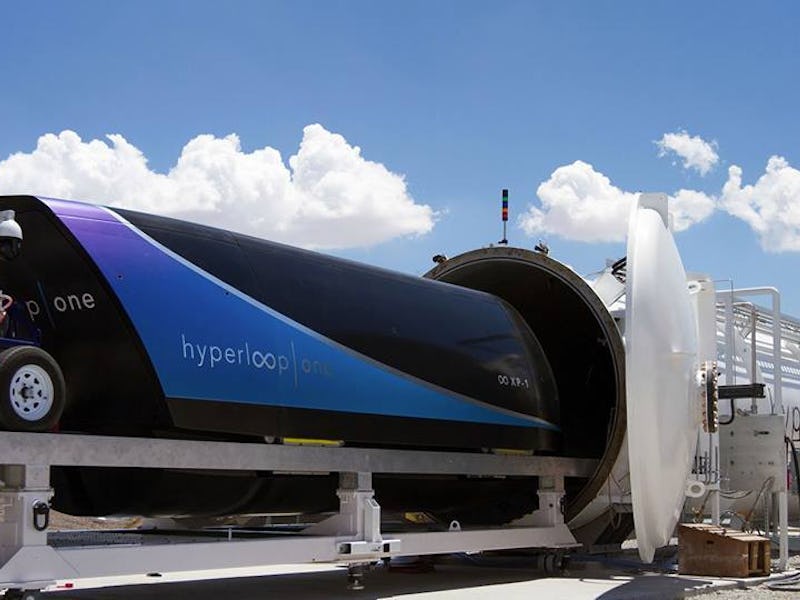
After competitions in the United States, Europe, and Asia earlier this year, Hyperloop One, the Los Angeles-based startup led by an Uber investor, a former SpaceX engineer, and former Cisco executives, announced on Thursday it had selected ten proposed routes for the first hyperloop.
The first hyperloop built by Hyperloop One — to say nothing of Elon Musk’s unaffiliated project, the Boring Company — could be built in one of these ten regions:
- Cheyenne-Denver-Pueblo
- Chicago-Columbus-Pittsburgh
- Miami-Orlando
- Dallas-Houston
- Edinburgh-London
- Glasgow-Liverpool
- Mexico City-Guadalajara
- Bengaluru-Chennai
- Mumbai-Chennai
- Toronto-Montreal
In a statement on Thursday, the company announced it would “commit meaningful business and engineering resources and work closely with each of the winning teams/routes to determine their commercial viability.” It was unclear actually when work on determining the viability would occur from the statement. A Hyperloop One representative declined to offer any further detail on a timeline when asked about it by Inverse.
The Hyperloop One hyperloop works similarly to what Elon Musk envisioned in his 2013 whitepaper: a tube with much of the air sucked out, creating a very low-pressure environment through which a pod would travel at a very high speed — Musk predicted 700 miles per hour — and sort of “float” using magnetic levitation. The original prediction in that whitepaper was San Francisco to LA in 30 minutes.
The Rocky Mountain Hyperloop that will see a feasibility study
An Early Green Light in Colorado
A team from Colorado comprised of stakeholders in the state’s government, as well as the multinational engineering firm AECOM (notable because AECOM has an existing deal with Hyperloop One to develop the company-spawned idea of developing the Port of Los Angeles) gets the green light early, though: It “will enter a public private partnership to begin a feasibility study in Colorado.”
“We think we’ve got a pretty good case,” Travis Boone, an engineer at AECOM and a member of the Colorado team, told Inverse at global challenge event in April in Washington, D.C.
Backing Boone’s group, named Rocky Mountain Hyperloop, was the the Colorado Department of Transportation and its director, Shailen Bhatt, who was also in D.C. in April. Bhatt said the group’s route, and more broadly, Colorado, was “uniquely positioned” for the super-fast tube transport.
“We are excited to partner with Hyperloop One in exploring the next step of feasibility of this innovative technology, potentially transforming how Colorado moves,” Bhatt said on Thursday. “The Hyperloop technology could directly align with our goals of improving mobility and safety in Colorado, and we have been encouraged by the continued progress the technology is taking.”
While AECOM’s involvement in the proposed route from Cheyenne, Wyoming to Pueblo, Colorado has been defined, notably included in Thursday’s news was that the engineering giant was involved in a total of five proposed routes.
Hyperloop One routes that will be investigated for viability, announced by the company on Thursday.
“That half of the winning teams are supported by AECOM demonstrates the power of our connected expertise and is further evidence that these are the kinds of problems AECOM is built to take on and solve,” said AECOM CEO Michael S. Burke. “We’re excited to be part of Hyperloop One’s efforts to create impactful use cases for a technology that can transform what it means to get from point A to B anywhere in the world.”
Called the “Hyperloop One Global Challenge,” the open call for proposals for Hyperloop routes was announced in May 2016, and 35 teams of finalists were announced in January. In May of this year, ten finalist routes were announced for Europe. In April, 11 finalist routes were announced for the United States. And in February, 5 finalists were announced for India.
Venture capitalist Shervin Pishevar, who’s invested in Uber and Airbnb among other ventures, co-founded Hyperloop One in 2014. Its president of engineering is Josh Giegel, a former SpaceX engineer, and its CEO, Rob Lloyd, and senior vice president of field operations, Nick Earle, are both Cisco executives.
The company announced its first successful full-scale test in August and released this video showing off their transportation tube: